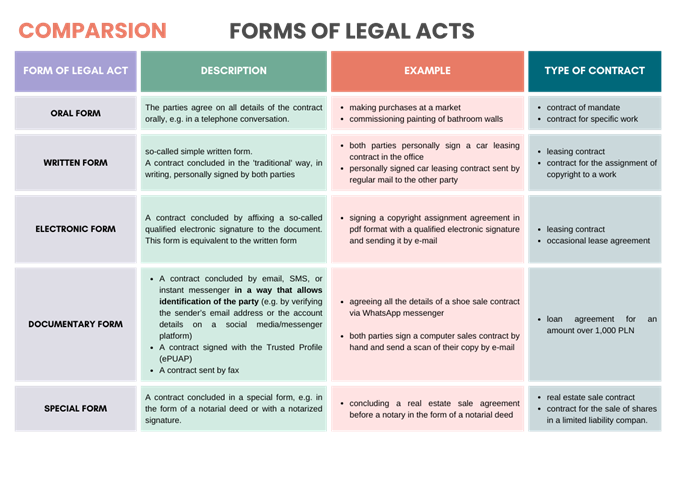Investment and commercial law Email and Contract Validity – When is Electronic Correspondence Sufficient to Conclude a Contract, and When Is It Not?

SUMMARY
• In many cases, email is sufficient to establish a valid civil-law contract. However, statutory requirements play a crucial role, as they may limit this possibility—especially regarding written form or a notarial deed.
• The assessment of whether a given contract can effectively be concluded remotely should be made individually in each case.
• For evidentiary purposes, it is best to ensure that a contract is concluded at least in documentary form (meaning in a way that allows the identification of the person making the declaration and the content thereof, e.g., by email).
When is a contract concluded?
According to the Polish Civil Code, a contract comes into effect when two or more parties make matching declarations of intent, and the declaration reaches the other party in such a way that they can familiarize themselves with its content.
The regulations provide for different forms of contract conclusion, depending on the type and value of the contract. In most cases, the parties are free to decide on the form of the contract. Many types of contracts may be concluded in any form: in writing, orally, or even by implication.
Forms of contract conclusion provided for by the Civil Code

Email as proof of contract conclusion
An exchange of emails or other electronic messages may be fully valid evidence in a court dispute. Courts have repeatedly recognized electronic correspondence as proof confirming the existence and terms of a contract, provided that the content clearly demonstrates the parties’ agreement and the right of the persons involved to conclude agreements on behalf of the respective entities.
Example:
• A properly authorized employee of Company X sends an email to a contractor:
“I am ordering 500 office chairs at a price of PLN 350 net per piece. Delivery by September 15.”
• In response, a representative of Company Y writes:
“I accept the order. I confirm execution on the terms specified.”
Such an exchange of correspondence, in practice, constitutes the valid conclusion of a contract and may serve as a basis for enforcing mutual obligations.
When is an email not sufficient to conclude a contract?
There are situations where the exchange of emails does not meet statutory requirements and does not result in a valid contract:
• The obligation for written form under pain of nullity (e.g., assignment of economic copyrights) requires a handwritten signature or a qualified electronic signature. An email exchange without a qualified signature is not sufficient.
• The requirement for a special form (notarial deed, notarized signatures)—the presence of a notary is required.
• Forms reserved by the parties themselves—if the parties agree that declarations must be made in a strictly defined form (e.g., written under pain of nullity), it is not possible to make them later in a less formalized manner, such as by email.
Can the parties themselves determine the form of the contract?
The parties have the freedom to stipulate a certain form for their contract. Therefore, if the contract states that it is concluded only in writing under pain of nullity, emails will not suffice for the contract to be valid.
Nevertheless, party autonomy regarding the form of the legal acts between them is limited by statutory provisions—the parties cannot agree that an act requiring a statutory form will be carried out in a less strict form than that required by law.
Example:
The law requires that a contract for the sale of shares in a limited liability company be concluded in writing with notarized signatures.
Therefore, a stipulation in the contract such as “The contract is concluded in ordinary written form or in documentary form” will be invalid.
Practical tips: how to protect yourself when concluding contracts by email?
1. Before concluding a contract, make sure that a written or other special form is not required for the contract in question;
2. If ordinary written form is required, remember that you can sign it with a qualified electronic signature;
3. If documentary form is sufficient: agree on all terms by email—clearly specifying the subject of the contract, remuneration, deadlines, and other key provisions;
4. Keep the correspondence—preferably in an unedited form, with message headers;
5. Obtain confirmations—for example, an email with clearly stated “I confirm the conclusion of the contract under the following terms”;
6. Make sure the person you are communicating with actually has the authority to conclude contracts on behalf of their company (check the National Court Register [KRS] or the Central Registration and Information on Business [CEIDG]), or has been authorized by such a person to conclude certain contracts (ask for a copy or scan of such a power of attorney);
7. If you concluded the contract by phone, send the contractor a confirmation of the arrangements by email or another text message. Ask the other party for clear confirmation.

